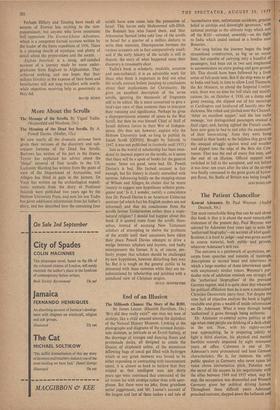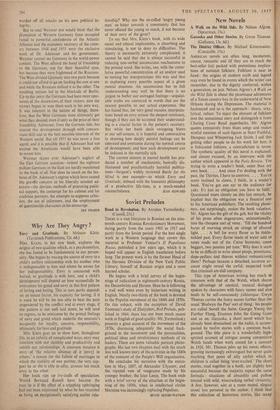The Patient Chancellor
THE most remarkable thing that can be said about this book is that it is about the most remarkable
statesman of the present day. Paul Weymar was selected by Adenauer four years ago to write his 'authorised biography'—on account of what quali- fications it is hard to judger—and was given access to source material, both public and private, wherever Adenauer's writ ran.
The outcome is a patchwork of quotations, ex- cerpts from speeches and minutes of meetings, descriptions at second hand and interviews in which a large number of those interviewed speak with suspiciously similar voices. Weymar's par- ticular style of adulation reminds one strongly of the 'authorised biographies' of the previous German regime, and it is quite clear that whatever his political affiliation then he is now a meticulous Christian-Democratic party-liner. Yet despite the utter lack of objective analysis the book is highly readable and gives a wealth of inside information on Dr. Adenauer. What it loses through being 'authorised' it gains through being authentic.
Dr. Adenauer re-entered active politics at an age when most people are thinking of a deck-chair in the sun. Now, with his eighty-second year approaching, he is preparing calmly to fight a third election, his physical and mental faculties scarcely impaired by eight strenuous years of office. Calmness is one of Dr. Adenauer's most pronounced and least German characteristics. He is, for instance, the only public speaker in Germany who never raises his voice above conversation pitch. Patience was the secret of his success in his negotiations with the allies between 1949 and 1955 when, step by step, the occupation was dismantled and Western Germany given her political driving licence. Throughout these difficult years Adenauer preached restraint, slapped down the hotheads and warded off all attacks on his own political in- tegrity.
But to read Weymar one would think that the promotion of Western Germany from occupied vassal to powerful confederate of the Atlantic Alliance and the economic recovery of the coun- try between 1948 and 1955 were the exclusive work of Dr. Adenauer and his government. Weymar cannot sec Germany in the world-power context. The West offered the hand of friendship to the Germans, not for their beautiful eyes, but because they were frightened of the Russians. The West divided Germany into two parts because it could not afford to go on feeding the cow at one end while the Russians milked it at the other. The resulting tension led to the blockade of Berlin. Up to this point the Germans had been mere spec- tators of the dissensions of. their victors; now the victors began to woo them each in his own way. It was inherent in the nature of things, there- fore, that the West Germans must ultimately get what they desired, even if only as the price of their . friendship. Adenauer, from the German side, has steered this development through with consum- mate skill and in the best possible interests of the Western world. But till 1955 he was never a free agent, and it is possible that if Adenauer had not existed the Americans would have been able to invent him.
Weymar skates over Adenauer's neglect of the East German question—indeed the eighteen million Germans in the East are hardly mentioned in the book at all. Nor does he touch on the fea- tures of Dr. Adenauer's regime which have caused the gravOtt concern to his liberally minded ad- mirers—the devious methods of procuring politi- cal support, the contempt for his cabinet and his coalition partners, the attempts to suppress critic- ism, the use of informers, and the employment of questionable characters in his entourage.
IAN FRASER































 Previous page
Previous page